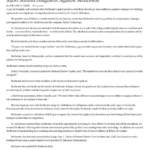Medtronic Must Pay Inventor $159 Million
By Barnaby J. Feder| SEPT. 29, 2004
A Memphis jury said yesterday that the medical equipment maker Medtronic must pay nearly $159 million to an inventor of spinal surgical devices for violating its licensing and royalty agreements with him.
The jury also found that some of the violations warranted further punitive damages. Those damage payments will be determined in a second phase of the bitter legal battle unless the two sides reach a settlement.
United States District Court Judge Jon P. McCalla told the jury yesterday that he expected the punitive damage phase of the trial to begin next week.
Both sides had cause for disappointment at the outcome, which gave Medtronic none of the hundreds of millions of dollars in damages, penalties and contract rights it sought from the inventor, Dr. Gary K. Michelson.
Dr. Michelson received only a fraction of the $1.7 billion, plus unspecified punitive damages, he sought in his counterclaim.
Even before the verdict was reached, after a three-month trial and more than a month of deliberation, some lawyers had anticipated an outcome that would leave both sides unhappy and had predicted that both would file appeals.
Spokesmen for the two sides declined to comment yesterday.
"It's tough to assess based on what we know now," said Dr. Mark Landy, an analyst who follows Medtronic for Susquehanna International Group in Bala Cynwyd, Pa. "Appeals courts often overturn jury verdicts on patents, and punitive damages is a wild card."
During testimony, Medtronic officials said that Dr. Michelson had demanded such high royalty rates for some of his newer innovations that paying them would eliminate the profits in its spinal division.
Several of Dr. Michelson's inventions have been combined with other innovations to give Medtronic a leading position in spinal fusion operations.
If Medtronic does not negotiate new royalty agreements, Dr. Michelson could seek to enjoin it from further use of some of his patents.
Dr. Landy said that Medtronic could choose to try to market designs that do not make use of the patents in question
Medtronic shares rose 35 cents to $50.85 per share yesterday.
Medtronic, based in Minneapolis, had revenues of $9.09 billion in the fiscal year that ended April 30. Medtronic does not break out the results of its spinal business, but analysts like Dr. Landy estimated that its revenues top $1.5 billion and that it has profit margins of at least 70 percent. It is one of Medtronic's fastest-growing units. Medtronic is not only one of the world's largest medical device makers but is also known for aggressive legal defense of its interests.
Dr. Michelson, a wealthy 55-year-old spinal surgeon from Los Angeles with more than 400 patents and 250 others pending, is no stranger to courtrooms either.
"Gary Michelson is unique," said Kenneth A. Liebman, a Minneapolis lawyer who was not involved in the Medtronic suit but has represented both allies and opponents of Mr. Michelson in other lawsuits. "I can't think of any other segment of the device industry where a single doctor has been so involved in litigation," he said.
The dispute grew out of disagreements over obligations under contracts in the early 1990's covering the licensing and sale of Dr. Michelson's inventions to Sofamor Danek, a company in Memphis that has formed the core of Medtronic's spinal business since Medtronic acquired it for $3.3 billion in 1999.
Medtronic initiated the lawsuit in 2001 by charging that Dr. Michelson had failed to accept the extent of Medtronic's rights to his inventions and was interfering with its business by marketing some of the inventions to competitors. It asked for $225 million in damages, plus an order tripling that award to punish Dr. Michelson.
A Medtronic memo introduced as evidence during the trial suggested that Medtronic hoped the action would push Dr. Michelson to negotiate new agreements to settle their disputes. Witnesses testified that not long before the lawsuit was filed, Medtronic proposed a deal that would guarantee Dr. Michelson $185 million in new royalties with the expectation that actual sales would raise such payments to as much as $500 million.
But Dr. Michelson counterclaimed that Medtronic violated his agreements with Sofamor Danek by not using its "best efforts" to develop and sell his inventions.
He also accused the company of harming patients by shelving development of some of his inventions as a way of protecting the profits of its fast-growing spinal business.
He also accused Medtronic of violating contractual obligations that gave him credit for his patented innovations when it incorporated them in its products. He also said that Medtronic's accounting and operating practices were manipulated to deprive him of tens of millions of dollars of royalties.
"I've lost three and a half years of my life to this," said Dr. Michelson in a recent telephone interview. "I haven't been able to practice or invent anything."
References
- Medtronic Must Pay Inventor $159 Million [2014.09.29. Barnaby J. Feder. New York Times]
- Medtronic vs. Michelson | Michelson Patents


![Medtronic Must Pay Inventor $159 Million [Barnaby J. Feder. 2014.09.29. New York Times] Medtronic Must Pay Inventor $159 Million [Barnaby J. Feder. 2014.09.29. New York Times]](https://www.michelsonmedicalpatents.org/wp-content/uploads/2004/10-29-medtronic-must-pay-inventor-$159-million-new-york-times/medtronic-must-pay-inventor-159-million-new-york-times-1.jpg)


 New York Times
New York Times